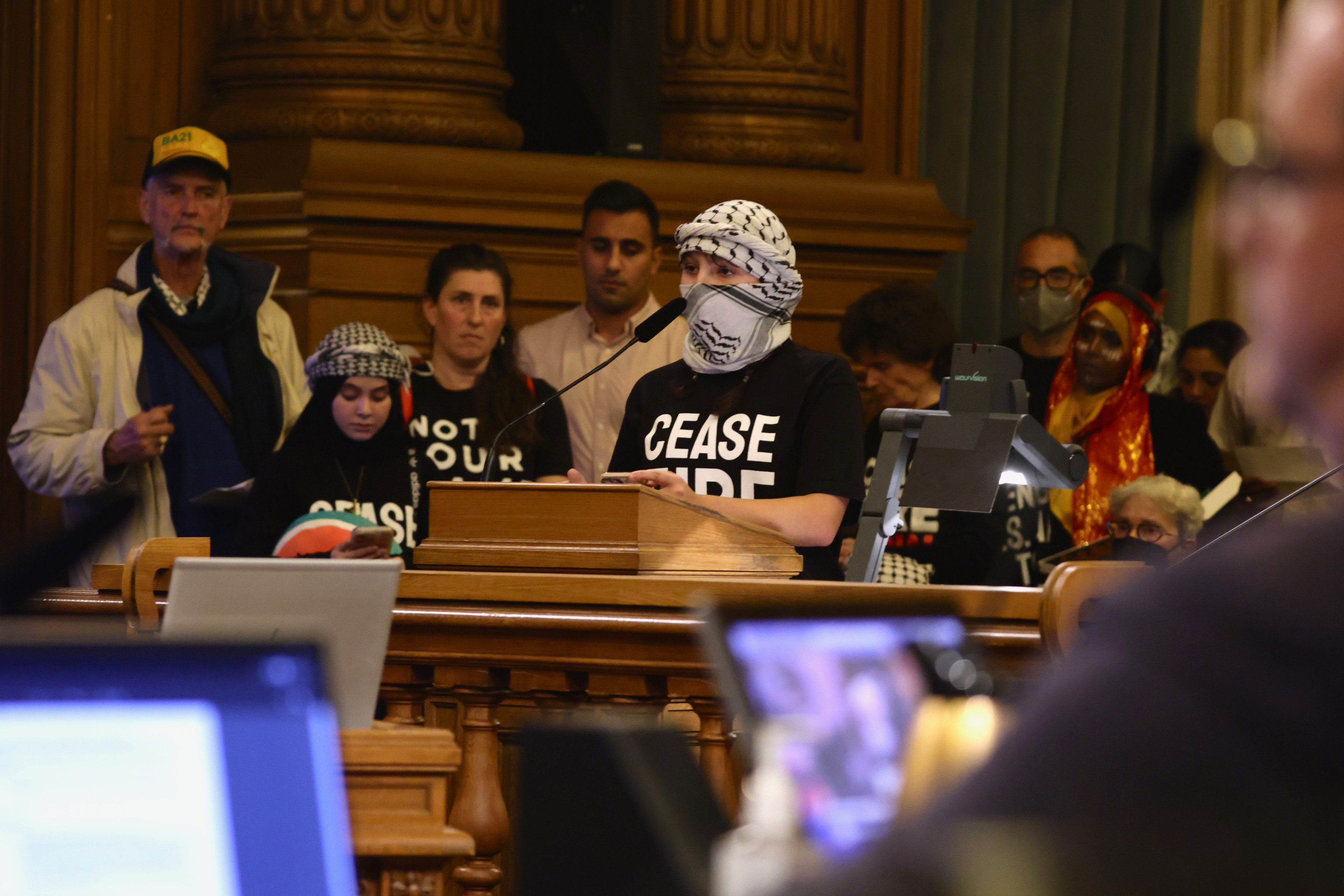For a stretch of roughly 40 days this past winter, San Francisco became a battleground over how elected officials should weigh in on one of the most third-rail political topics in America: the Israel-Hamas war.
For some, the resolution calling for a cease-fire in Gaza dovetailed neatly with the city’s long history of progressive activism: Of course, San Francisco was going to say something about this.
But the long hours of heated debate came at a fraught time for the city. San Francisco has had to take a long, hard look in the mirror at the issues going on at home—the post-Covid economy, public safety, housing and homelessness—leaving others wondering why it was spending so much time on a conflict thousands of miles away.
Months later, as polling shows voters are frustrated by the state of the city, some lawmakers want the Board of Supervisors to focus on local problems.
On Tuesday, Supervisor Joel Engardio will introduce a resolution calling for the board to spend its time debating what are salt-of-the-earth municipal issues: taxes, zoning and permitting. He says the city should only pass resolutions about outside issues if there is “a clear consensus” among board members about “non-contentious” matters.
“This resolution is forward-looking,” Engardio said in an interview. “l don’t want to relitigate the [Gaza cease-fire] resolution. We live in a tumultuous world. There will be plenty of issues outside of our jurisdiction. It doesn’t ban or preclude us from weighing in on anything. It’s just a reminder on what we have control over.”
Engardio’s view is attracting broad support among his colleagues: Board President Aaron Peskin, Myrna Melgar, Matt Dorsey and Ahsha Safaí as co-sponsors. Still, his declaration is nonbinding and does nothing to prevent his colleagues from introducing a resolution about something outside the city’s borders.
Engardio’s resolution, along with remarks from Mayor London Breed that San Francisco had “gotten away from delivering the basics,” reflects a fundamental question: Should the city clean up its own house before wading into foreign affairs? Does the city need to tidy up its own home first before it can proclaim itself as the shining example of liberal politics for the rest of the country and the world?
“Feedback that I heard from a lot of people I represent and from around the city included a category of criticism that we have problems to solve that are within our control and maybe foreign policy pronouncements were not a good use of our time,” Dorsey said. “I do think we should be focused on the job we’re doing as the people responsible for governing our city.”
A resolution splits the community
In late December, Supervisor Dean Preston introduced a resolution calling for a cease-fire, immediately lighting a firestorm among the city’s Jewish and Palestinian communities.
In January, a revised version of the resolution drafted by Peskin called for a cease-fire, the release of the Israeli hostages held by Hamas and for humanitarian aid to be provided to Gazans. Sold as a compromise, the resolution also condemned Islamophobia and antisemitism while denouncing both the Oct. 7 attack from Hamas and the Israeli military response.
Peskin’s resolution passed 8-3, with Engardio, Melgar, Safaí, Preston, Connie Chan, Hillary Ronen and Shamann Walton in support. Supervisors Dorsey, Rafael Mandelman and Catherine Stefani opposed it.
The meetings were highly contentious, and video snippets went viral on the internet.
At the time, Preston said San Francisco was the largest of about 60 cities to pass a cease-fire resolution after elected officials in Seattle, Detroit and Jacksonville, voted on similar declarations.
Preston and Peskin are both Jewish, as are Mandelman, Melgar and Ronen. Preston declined to comment for this article through a spokesperson.
Breed chose to not sign the resolution, saying it had “inflamed division and hurt” and didn’t reflect the values of the whole community. She didn’t go as far as vetoing the declaration, a move that would have required another vote and likely continued debate.
‘The basics of the city is to be engaged in the rest of the world’
For Lincoln Mitchell, who splits his time between San Francisco and New York as a Columbia University politics professor, Engardio’s efforts to shift the board’s attention goes against everything the city has stood for.
“It’s an effort to reframe the city,” Mitchell said. “‘We’re no longer a city that gets involved in big picture issues,’ … I would argue the basics of the city is to be engaged in the rest of the world. This is not some small, little city.”
This past winter’s debate certainly wasn’t the first time the city has reached outside of its borders.
In 2006, the board passed a declaration calling for the U.S. government to stop mass killings in Darfur. In 2022, it approved a resolution in support of Ukrainian refugees after Russia’s invasion. The board has also weighed in on past historical events that remain controversial in some geopolitical corners, like the Armenian genocide. Turkey denies the deaths constituted genocide and it was only recently formally recognized by the U.S. government in 2021.
Zahra Billoo, executive director at the San Francisco Bay Area’s Council on American-Islamic Relations, who advocated for the city’s Israel-Gaza cease-fire resolution, says leaving foreign policy on the shelf would go against the wishes of many in the city.
“Frankly, it troubles me that anyone would respond to this by saying, ‘We should do less of it in the future,’” she said.
